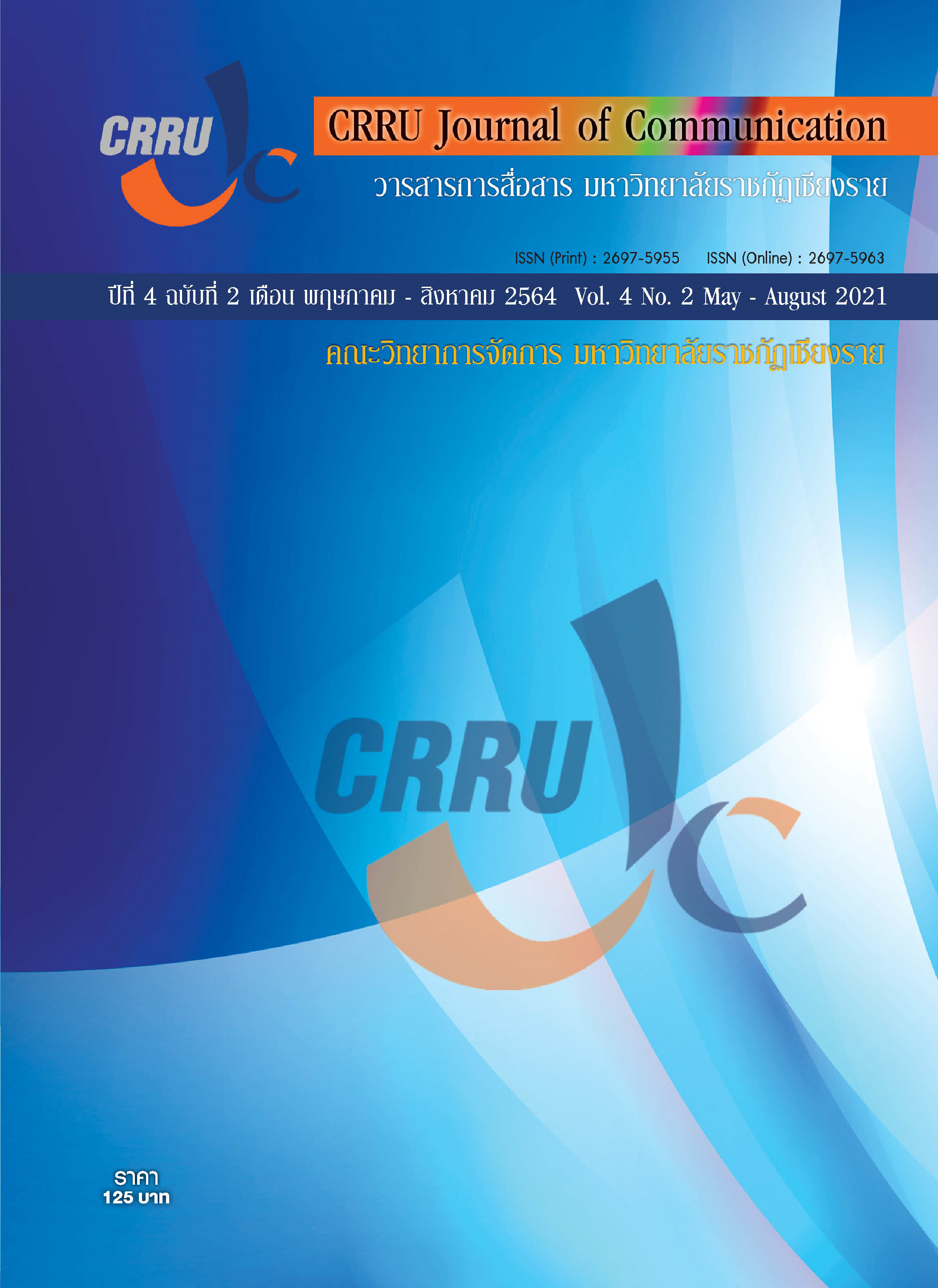Parents' Guide to Information Filtering for Youth in the Free Era
Main Article Content
Abstract
Thai youth is categorized into a group that accessing to social media with ease because they unavoidably use internet to access into their daily online activities. This situation can be led to problems caused by easily access to social media of Thai youth such as Online gambling, Games, Pornographic media. Therefore, this article presents ways to filter data and information for Thai Youth in the Free era for parents and guardians as protectors of Thai Youth. Parents and Guardians have to understand the characteristics of Thai Youth, understand the online behavior of youth using the online platform, and acknowledge and understand ways to filter data and information including participating in a role to help Thai Youth to critically acquire and receive data and information. As a result, 1) Parents should learn to accept the change of online media in the free era along with Thai Youth. 2) Parents should be a role model to be critically received information and to critically understand the media in the Free era. Lastly, 3) Parents should be people who participate to help Youth to have proper skills to critically think.
Article Details
References
คณะกรรมการส่งเสริมการพัฒนาเด็กและเยาวชนแห่งชาติ, (2560). แผนพัฒนาเด็กและเยาวชนแห่งชาติ ฉบับที่ 2 พ.ศ. 2560-2564. พิมพ์ครั้งที่ 2. กรุงเทพฯ : โรงพิมพ์ เจ. เอส. การพิมพ์.
ณัฎฐกาญจน์ ศุกลรัตนเมธี และนุชประภา โมกข์ศาสตร์. (2564). การรู้เท่าทันสื่อสังคมออนไลน์ของเยาวชนเพื่อการเป็นพลเมืองในสังคมประชาธิปไตย. สำนักวิจัยและพัฒนาสถาบันพระปกเกล้า.
ธันยวนันฐ์ เลียนอย่าง และคณะ. (2561). ทักษะการรู้เท่าทันสื่อเกมออนไลน์ในเยาวชน. สมาคมสถาบันอุดมศึกษาเอกชนแห่งประเทศไทย. 24(2), 167-179.
นวลจันทร์ จุฑาภักดีกุล. (2559). เด็กยุคดิจิตอล. สารานุกรมศึกษาศาสตร์. สืบค้นเมื่อ
มิถุนายน 2564. เข้าถึงได้จาก http://ejournals.swu.ac.th/index.php/ENEDU/article/view/6704
นิตยา วงศ์ใหญ่. (2560). แนวทางการพัฒนาการรู้ดิจิทัลของดิจิทัลเนทีฟ. วารสารมหาวิทยาลัยศิลปากร. 10(2), 1630-1642.
พจนานุกรม ฉบับราชบัณฑิตยสถาน พ.ศ. 2554. (2554). สืบค้นเมื่อ 27 พฤษภาคม 2564, เข้าถึงได้จาก https://dictionary.orst.go.th/
พาสนา จุลรัตน์. (2563). จิตวิทยาการรู้คิด. กรุงเทพฯ : สำนักพิมพ์จุฬาลงกรณ์มหาวิทยาลัย.
ภัทริกา วงศ์อนันต์นนท์. (2557). พฤติกรรมการใช้อินเทอร์เน็ตของเด็กและเยาวชน. วารสารพยาบาลทหารบก. 15(2), 173-178.
มูลนิธิอินเทอร์เน็ตร่วมพัฒนาไทย. (2563). สอนลูกออนไลน์ปลอดภัย. สืบค้นเมื่อ 25 มิถุนายน 2564, เข้าถึงได้จาก https://thaihotline.org/2020/12/06/%E0%B8%84%E0%B8%B3%E0%B9%81%E0%B8%99%E0%B8%B0%E0%B8%99%E0%B8%B3%E0%B8%AA%E0%B8%B3%E0%B8%AB%E0%B8%A3%E0%B8%B1%E0%B8%9A%E0%B8%9E%E0%B9%88%E0%B8%AD%E0%B9%81%E0%B8%A1%E0%B9%88%E0%B8%9C%E0%B8%B9%E0%B9%89/
ศูนย์วิจัยมหาวิทยาลัยกรุงเทพ. (2556). ศึกษาปัญหาเยาวชนกับโลกออนไลน์. สืบค้นเมื่อ31 พฤษภาคม 2564, เข้าถึงได้จาก https://sites.google.com/a/srp.ac.th/srp3308/home/suksa-payha
ศูนย์วิชาการและเครือข่ายวิชาการด้านเด็ก เยาวชน และครอบครัว. (2564). 7 ขั้นตอนสู่การเป็นพ่อแม่ยุคดิจิทัล. สืบค้นเมื่อ 3 มิถุนายน 2564, เข้าถึงได้จาก http://www.cydcenter.com/hot-issue/7-%E0%B8%82%E0%B8%B1%E0%B9%89%E0%B8%99%E0%B8%95%E0%B8%AD%E0%B8%99%E0%B8%AA%E0%B8%B9%E0%B9%88%E0%B8%81%E0%B8%B2%E0%B8%A3%E0%B9%80%E0%B8%9B%E0%B9%87%E0%B8%99%E0%B8%9E%E0%B9%88%E0%B8%AD%E0%B9%81%E0%B8%A1/
สยามรัฐสัปดาห์วิจารณ์. (2557). การสำรวจสถิตแห่งชาติ : ศึกษาปัญหาเยาวชนกับโลกออนไลน์. สืบค้นเมื่อ 31 พฤษภาคม 2564, เข้าถึงได้จาก https://sites.google.com/a/srp.ac.th/srp3308/home/suksa-payha
สุวิทย์ มูลคำ. (2547). กลยุทธ์การสอนคิดอย่างมีวิจารณญาณ. กรุงเทพฯ : ห้างหุ้นส่วนจำกัด ภาพพิมพ์.
สำนักงานกองทุนสนับสนุนการสร้างเสริมสุขภาพ (สสส.). วัยรุ่นกับการใช้สื่อออนไลน์. สืบค้นเมื่อ 31 พฤษภาคม 2564, เข้าถึงได้จากhttps://resourcecenter.thaihealth.or.th/%E0%B8%84%E0%B8%A7%E0%B8%B2%E0%B8%A1%E0%B8%AA%E0%B8%B1%E0%B8%A1%E0%B8%9E%E0%B8%B1%E0%B8%99%E0%B8%98%E0%B9%8C-%E0%B8%84%E0%B8%A3%E0%B8%AD%E0%B8%9A%E0%B8%84%E0%B8%A3%E0%B8%B1%E0%B8%A7-%E0%B8%8A%E0%B8%B8%E0%B8%A1%E0%B8%8A%E0%B8%99-%E0%B8%9B%E0%B8%B1%E0%B8%88%E0%B8%88%E0%B8%B1%E0%B8%A2%E0%B9%81%E0%B8%A7%E0%B8%94%E0%B8%A5%E0%B9%89%E0%B8%AD%E0%B8%A1-?hcb=1
สำนักงานส่งเสริมสังคมแห่งการเรียนรู้และคุณภาพเยาวชน (สสค.). (2559). 8 ทักษะที่เด็กเยาวชนยุคใหม่ควรเรียนรู้ในการเป็นพลเมืองยุคดิจิตอล. สืบค้นเมื่อ 1 มิถุนายน 2564, เข้าถึงได้จาก https://www.kroobannok.com/80610
สำนักงานปลัดกระทรวงการอุดมศึกษา วิทยาศาสตร์ วิจัยและนวัตกรรม. (2564). ทักษะดิจิทัล ก้าวสู่ พลเมืองในศตวรรษที่ 21. สืบค้นเมื่อ 2 มิถุนายน 2564, เข้าถึงได้จาก https://www.ops.go.th/main/index.php/knowledge-base/article-pr/1355-goto-citizens21st.html
Ben Domingue. (2021). New Stanford study sheds light on how much learning young students have lost during stages of the pandemic. สืบค้นเมื่อ 27 พฤษภาคม 2564, เข้าถึงได้จาก https://ed.stanford.edu/news/new-stanford-study-sheds-light-how-much-learning-young-students-have-lost-during-stages?print=all
Brooke Donald. (2019). High school students are unprepared to judge the credibility of information on the internet, according to Stanford researchers. สืบค้นเมื่อ
พฤษภาคม 2564, เข้าถึงได้จาก https://ed.stanford.edu/news/high-school-students-are-unprepared-judge-credibility-information-internet-according-stanford.
Dtac safe internet. (2559). คู่มือพ่อแม่ดิจิทัล เข้าใจลูก เข้าใจโลกไซเบอร์. สืบค้นเมื่อ
กันยายน 2564, เข้าถึงได้จาก http://resource.compassionth.com/?p=458
Elizabeth Kozleski. (2021). Stanford researchers connect local families and tech designers to support students with learning differences. สืบค้นเมื่อ 27 พฤษภาคม 2564, เข้าถึงได้จาก https://ed.stanford.edu/news/stanford-researchers-connect-local-families-tech-designers-support-students-learning
Patricia Hunt. (2020). New Literacy Project : Founded on Facts. NLP Brochure 2020 Digital (2).pdf.
Peter Ellerton. (2014). How to teach students to think critically. สืบค้นเมื่อ 27 พฤษภาคม 2564, เข้าถึงได้จาก https://www.weforum.org/agenda/2014/12/how-to-teach-students-to-think-critically/


